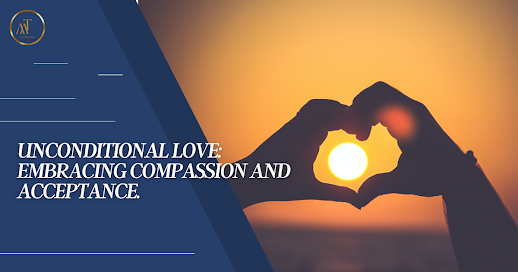Introduction:
Love is a powerful force that has the ability to heal, transform, and uplift our lives. When we embrace unconditional love, we open ourselves to a profound sense of compassion and acceptance, not only for others but also for ourselves. In this blog post, we will explore the concept of unconditional love and its transformative impact on our relationships, personal growth, and overall well-being. By cultivating a mindset of compassion and acceptance, we can create a world filled with love and build deeper connections with ourselves and those around us.
1, Understanding Unconditional Love:
Unconditional love is a boundless and limitless form of love that transcends judgment, conditions, and expectations. It is a love that accepts others and ourselves as we are, embracing both the light and shadow aspects of our being. By understanding the essence of unconditional love, we can cultivate a mindset that promotes compassion and acceptance.
2, Embracing Self-Love:
Unconditional love begins with self-love. It involves recognizing our inherent worth and treating ourselves with kindness, respect, and compassion. Embrace self-love by practicing self-care, setting healthy boundaries, and nurturing your physical, mental, and emotional well-being. When we love ourselves unconditionally, we can extend that love to others.
3, Cultivating Empathy:
Empathy is an essential aspect of unconditional love. It involves putting ourselves in others' shoes and seeking to understand their experiences and emotions. Cultivate empathy by actively listening to others, practicing non-judgment, and offering support and understanding. When we empathize with others, we create a space for deep connection and foster a sense of belonging.
4, Letting Go of Judgment:
Unconditional love requires us to let go of judgment and embrace acceptance. Recognize that everyone is on their own unique journey, facing their own challenges and triumphs. Release the need to label or criticize others, and instead, focus on their inherent goodness and potential. By letting go of judgment, we create a space for love and understanding to flourish.
5, Practicing Forgiveness:
Forgiveness is an integral part of unconditional love. It involves releasing resentment, grudges, and past hurts, allowing room for healing and growth. Practice forgiveness for yourself and others, understanding that holding onto negativity only hinders our ability to love unconditionally. Forgiveness frees us from the burdens of the past and opens us up to love and compassion.
6, Extending Kindness:
Kindness is a powerful expression of unconditional love. Engage in acts of kindness towards yourself and others. Offer a helping hand, a listening ear, or a kind word to those in need. Small acts of kindness can have a ripple effect, spreading love and positivity throughout the world.
7, Embracing Vulnerability:
Unconditional love requires vulnerability—the willingness to be open, honest, and authentic. Embrace vulnerability by sharing your true thoughts, feelings, and experiences with others. Create a safe space where vulnerability is welcomed and celebrated. Through vulnerability, we foster deeper connections and invite love into our lives.
8, Practicing Gratitude:
Gratitude is an essential component of unconditional love. Take time each day to express gratitude for the blessings in your life. Focus on the positive aspects of people and situations, even in challenging times. Gratitude cultivates a mindset of abundance, fostering love and appreciation for the present moment.
9, Choosing Love in Difficult Times:
Unconditional love is tested in difficult times. It is a choice we make to respond with love and compassion, even when faced with adversity. When faced with challenges, consciously choose love over fear, anger, or resentment. By choosing love, we transform difficult situations into opportunities for growth and healing.
10, Spreading Unconditional Love:
Extend the ripple of unconditional love beyond yourself. Share acts of kindness, compassion, and acceptance with others. Offer support, encouragement, and understanding to those around you. By spreading unconditional love, you contribute to a more loving and harmonious world.
11, Practicing Self-Compassion:
Extend the same level of compassion and acceptance you have for others to yourself. Practice self-compassion by treating yourself with kindness, understanding, and forgiveness. Embrace your imperfections and offer yourself the same love and grace you extend to others.
12, Embracing Diversity:
Unconditional love embraces diversity in all its forms. Celebrate and appreciate the uniqueness of individuals, cultures, and perspectives. Embrace inclusivity, respect differences, and learn from one another. By embracing diversity, we create an environment of love, acceptance, and unity.
13, Nurturing Relationships:
Cultivate loving and nurturing relationships based on trust, respect, and authenticity. Surround yourself with people who support and uplift you, and reciprocate that love and support. Invest time and effort into nurturing relationships that enrich your life and foster a sense of belonging.
14, Practicing Mindful Communication:
Communicate with mindfulness and compassion. Listen attentively, speak with kindness, and choose words that uplift and empower others. Practice active listening and seek to understand before being understood. Mindful communication fosters deeper connections and allows love to flow freely.
15, Remembering the Power of Love:
In moments of doubt or challenge, remind yourself of the transformative power of love. Love has the ability to heal, unite, and bring about positive change. Let love guide your thoughts, words, and actions, and trust in its ability to create a better world.
Conclusion:
Unconditional love is a powerful force that has the potential to transform our lives and the world around us. By embracing compassion, acceptance, and kindness, we create a space for love to flourish. Let us nurture the practice of unconditional love within ourselves and extend it to others, creating a world filled with love, understanding, and harmony.
.png)




















